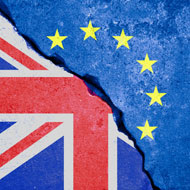Welsh government urged to guard against vet shortfall

One in five vets in Wales is a non-UK EU national.
BVA president John Fishwick has called on the Welsh government to guard against a serious shortfall of vets following Brexit.
His call comes amid growing concerns about how Britain’s exit from the European Union will affect vets in Wales. According to figures from the RCVS, one in five vets in Wales is a non-UK EU national and this figure rises to 100 per cent when applied to Official Veterinarians.
Speaking to guests at the BVA’s Annual Welsh Dinner (26 June), Mr Fishwick said: “Positive action is needed now to avoid a serious shortfall in capacity. This is especially important when it comes to protecting against food fraud and animal welfare breaches, as it is imperative to preserve high levels of consumer confidence in Welsh produce, both at home and overseas.
“The situation is a serious one, but we are at least encouraged by the strength of feeling and scale of work being done to ensure that vets’ voices on Brexit are being heard and harnessed both in Wales and across the UK.”
Among the dinner guests included Wales' rural affairs secretary Lesley Griffiths, Welsh assembly members, key representatives from animal health and welfare organisations, and colleagues from across the veterinary profession.
The BVA has been working with MPs and cabinet members to boost support for Welsh vets amid the challenges posed by Brexit. This week, 20 assembly members sent a letter to environment secretary Michael Gove urging him to support calls to reinstate vets on the shortage occupation list.
During his speech, Mr Fishwick called on the Welsh Government to follow England’s lead and make CCTV in abattoirs compulsory. He also praised the joined-up working underway in Wales to tackle serious animal health problems such as bovine tuberculosis and bovine viral diarrhoea.
He concluded by thanking the BVA Welsh Branch for its hard work in the past year engaging members in policy and giving them a strong voice on key issues.



 The Veterinary Medicines Directorate (VMD) is inviting applications from veterinary students to attend a one-week extramural studies (EMS) placement in July 2026.
The Veterinary Medicines Directorate (VMD) is inviting applications from veterinary students to attend a one-week extramural studies (EMS) placement in July 2026.